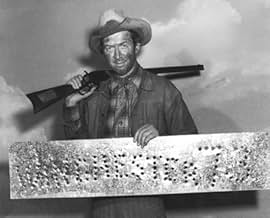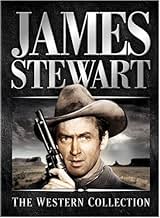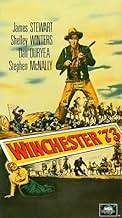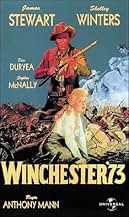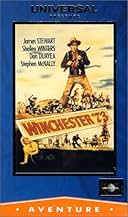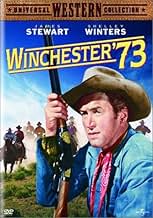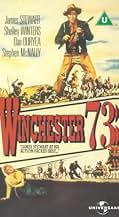NOTE IMDb
7,6/10
23 k
MA NOTE
Le trajet d'un fusil prisé d'un propriétaire malheureux à un autre et la poursuite d'un cow-boy meurtrier en cavale.Le trajet d'un fusil prisé d'un propriétaire malheureux à un autre et la poursuite d'un cow-boy meurtrier en cavale.Le trajet d'un fusil prisé d'un propriétaire malheureux à un autre et la poursuite d'un cow-boy meurtrier en cavale.
- Réalisation
- Scénario
- Casting principal
- Récompenses
- 1 victoire et 1 nomination au total
Tony Curtis
- Doan
- (as Anthony Curtis)
Victor Adamson
- Townsman
- (non crédité)
Robert Anderson
- Basset
- (non crédité)
Avis à la une
There are several sections. The first is the set up - Jimmy Stewart and Millard Mitchell ride into town and run smack dab into Wyatt Earp, who takes their guns away, temporarily of course, or we'd have no movie. Then we see that Jimmy's looking for someone, and we get the gun shooting contest between him and his nemesis, Dutch Henry Brown, played by an evil evil Stephen McNally. We don't understand why Jimmy hates him so, or is hunting him. We also get a brief appearance by saloon gal Shelley Winters.
Then Jimmy gets jumped and he starts the real search of the film, this time for the Winchester he's won fair and square, but which the jealous Dutch steals. This is one of the first Winchesters, and it's considered very valuable, mention is made that only a few other people like President Grant have them.
Along the way, we meet a besieged U. S. army company, are attacked by Indians, see Shelley's boyfriend Charles Drake cringe in terror during the raid (he's very effective as a man haunted by his fear of confrontation and gorgeous to boot...Shelley is a fool to pick Jimmy, even if he isn't afraid of anything), and Dan Duryea pops in as Dutch's even MORE weaselly pal who has eyes for Shelley too. Finally, as we expected, Jimmy catches up with Dutch, but there is a twist that knocks my socks off every time, even though I've seen the movie before.
The Indian threat seems very real in this movie, and mention is made of Little Big Horn, which has just happened. The talk about the raid is not too embarrassing, although the Indian leader is played by Rock Hudson in full makeup, who I didn't recognize.
The supporting cast is superb, most notably John McIntire and Jay C. Flippen, who were to me the most intriguing members of the cast. I could have watched a whole movie of John McIntire playing cards, and another whole movie of Jay C. Flippen just sitting around reminiscing about the Civil War. Why couldn't they once just put these two guys in the front of a movie? They make it all work, along with Millard Mitchell, who is a lighthearted, loyal buddy to Jimmy, the man with the dark secret.
Then Jimmy gets jumped and he starts the real search of the film, this time for the Winchester he's won fair and square, but which the jealous Dutch steals. This is one of the first Winchesters, and it's considered very valuable, mention is made that only a few other people like President Grant have them.
Along the way, we meet a besieged U. S. army company, are attacked by Indians, see Shelley's boyfriend Charles Drake cringe in terror during the raid (he's very effective as a man haunted by his fear of confrontation and gorgeous to boot...Shelley is a fool to pick Jimmy, even if he isn't afraid of anything), and Dan Duryea pops in as Dutch's even MORE weaselly pal who has eyes for Shelley too. Finally, as we expected, Jimmy catches up with Dutch, but there is a twist that knocks my socks off every time, even though I've seen the movie before.
The Indian threat seems very real in this movie, and mention is made of Little Big Horn, which has just happened. The talk about the raid is not too embarrassing, although the Indian leader is played by Rock Hudson in full makeup, who I didn't recognize.
The supporting cast is superb, most notably John McIntire and Jay C. Flippen, who were to me the most intriguing members of the cast. I could have watched a whole movie of John McIntire playing cards, and another whole movie of Jay C. Flippen just sitting around reminiscing about the Civil War. Why couldn't they once just put these two guys in the front of a movie? They make it all work, along with Millard Mitchell, who is a lighthearted, loyal buddy to Jimmy, the man with the dark secret.
The picture is developed in 1873 and talks about Lin McAdam (James Stewart , extremely anxious to show up in more challenging characters) and High Spade (Millard Michell) arrive in Dodge City looking for an enemy called Dutch Henry (Stephen McNally) . The sheriff Wyatt Hearp (Will Geer , though initially felt he was badly miscast ) obligates them to leave their guns . Both of them participate in a shot-contest and Stewart shot (actually shot by renowned marksman Herb Parsons) a bullet through the washer with the postage stamp, then he earns a Winchester 73 , the greatest rifle in the west , but it is robbed and starting the possession through hand to hand (John McIntire , Charles Drake , Dan Duryea) . Meanwhile , the starring going on a merciless vengeance.
First western interpreted by James Stewart , subsequently following a lot , most of them directed by Anthony Mann ; formerly , in the early 1930s Stewart had worked with Mann in the theater . At the time of shooting , James was very worried that the general perception was of him as a limited actor, then he found filmmaker Anthony Mann very helpful in breaking that perception. Both , Stewart and Mann achieved to revive the genre during the decade 50s . James Stewart inaugurated a new type of wage, the percentage on the box office that will imitate posteriorly others great Hollywood stars . The film has an extraordinary casting , including brief apparition by Rock Hudson and Tony Curtis , both of whom newcomers . Of course, all the western's essential elements are in this film, such as : Shootouts , Red Indian attack , violent raids by outlaws , final showdown , among others .
The breathtaking cinematography in black and white is made by Greta Garbo's favourite photographer : Willian Daniels . Although the script results to be an adaptation based on ¨Big gun¨ , a novel written by Stuart L. Lake and screenwriter by prestigious Borden Chase, being also based about real events because 4 July 1876 in Dodge City had a shot competition and the winner was rewarded with a Winchester 73 model 1873 with ability shoot 17 cartridges caliber 44/40 in a few seconds .The picture was well narrated and directed by the magnificent director Anthony Mann , though Fritz Lang was originally slated to direct this movie , when he backed out, James Stewart recommended Anthony Mann . Anthony made abundant classic western , such as : ¨Bend the river¨ , ¨Far country¨ , ¨Man of Laramie¨ , ¨Naked spur¨, ¨Tin star¨ and several others . Better than average . Rating : 8/10. Well worth watching .
First western interpreted by James Stewart , subsequently following a lot , most of them directed by Anthony Mann ; formerly , in the early 1930s Stewart had worked with Mann in the theater . At the time of shooting , James was very worried that the general perception was of him as a limited actor, then he found filmmaker Anthony Mann very helpful in breaking that perception. Both , Stewart and Mann achieved to revive the genre during the decade 50s . James Stewart inaugurated a new type of wage, the percentage on the box office that will imitate posteriorly others great Hollywood stars . The film has an extraordinary casting , including brief apparition by Rock Hudson and Tony Curtis , both of whom newcomers . Of course, all the western's essential elements are in this film, such as : Shootouts , Red Indian attack , violent raids by outlaws , final showdown , among others .
The breathtaking cinematography in black and white is made by Greta Garbo's favourite photographer : Willian Daniels . Although the script results to be an adaptation based on ¨Big gun¨ , a novel written by Stuart L. Lake and screenwriter by prestigious Borden Chase, being also based about real events because 4 July 1876 in Dodge City had a shot competition and the winner was rewarded with a Winchester 73 model 1873 with ability shoot 17 cartridges caliber 44/40 in a few seconds .The picture was well narrated and directed by the magnificent director Anthony Mann , though Fritz Lang was originally slated to direct this movie , when he backed out, James Stewart recommended Anthony Mann . Anthony made abundant classic western , such as : ¨Bend the river¨ , ¨Far country¨ , ¨Man of Laramie¨ , ¨Naked spur¨, ¨Tin star¨ and several others . Better than average . Rating : 8/10. Well worth watching .
This stirring western spins the tale of the famous rifle of the early west that was coveted by one and all. James Stewart is the cowboy who wins the prized Winchester in a shootout, only to lose it in a robbery. The story details Stewart's pursuit of the rifle and a certain man through the film. The rifle changes hands time after time, as though the owner is fated to lose it through violence. The picture has plenty of action and suspense as Stewart closes in on his quarry. A great cast supports Stewart here, namely Stephen McNally, Dan Duryea, Millard Mitchell, John McIntire and Jay C. Flippen. Shelley Winters seems miscast here and the purpose of her role is rather obscure. Tony Curtis and Rock Hudson, teen heartthrobs in later years, have brief but good roles.
For the viewer who comes upon it long after its making, "Winchester '73" has something in common with "Casablanca." While you watch it, you get this feeling that you're looking at a string of clichés encountered so often in the genre; then you realise that the clichés became clichés only after being copied from this particular film, and that they were so widely copied because this film was so great. In other words, it's a seminal work.
"Winchester '73" is a joy to watch. The broad lines of the plot are somewhat predictable, but mostly because you've seen them copied so many times in later movies, and nevertheless it still contains a number of twists which surprise you. The dialogue, the pacing and Mann's direction are excellent. Stewart shines in particular, and if you're a fan this is a "must-see," but he is not alone in delivering a good performance. Remarkably, many of the most thoughtful and/or witty lines go to minor characters. Because this makes these characters (much) more than cardboard cutouts, it lent additional realism to the film.
This is a remarkably underrated film, and well worth keeping an eye out for. The DVD also contains an interview with Stewart which provides some background on the film.
"Winchester '73" is a joy to watch. The broad lines of the plot are somewhat predictable, but mostly because you've seen them copied so many times in later movies, and nevertheless it still contains a number of twists which surprise you. The dialogue, the pacing and Mann's direction are excellent. Stewart shines in particular, and if you're a fan this is a "must-see," but he is not alone in delivering a good performance. Remarkably, many of the most thoughtful and/or witty lines go to minor characters. Because this makes these characters (much) more than cardboard cutouts, it lent additional realism to the film.
This is a remarkably underrated film, and well worth keeping an eye out for. The DVD also contains an interview with Stewart which provides some background on the film.
The traditional Western is synonymous with wide open spaces, clearcut morality, inevitable storylines, the optimistic faith in a hero's ability to shape his own destiny, to escape his past. These qualities reflect directly the American sense of self, the self-shaping Dream, the pushing of boundaries and frontiers, which is why the genre is still alluded to by opportunistic politicians. With some noble exceptions (eg Wellman, Hawks), the Western was healthily free of neuroses or real anxiety. Anthony Mann changed all that forever, and this first foray into the genre is one of the most violent, vivid, complex, not to say exciting Westerns ever made.
The traditional Western depends on a hero who exemplifies rugged wholesomeness, whatever misfortunes he may have had in the past, a supporter of order and right, who dominates the film, removes its obstacles, restores harmony in effect; and an obvious villain, who often, ironically, drives the plot, forces the hero into certain actions. The difference between the two is often delineated as mythically simple as the wearing of white or black hats.
Mann's background was in film noir, a genre antithetical to wide open spaces and optimism. Noir was neurotically charged, focusing on the dissolution of an unstable protagonist, where morality is blurred, the hero is as often the villain, trapped in an interior-labyrinth of his own making, a passive victim to destiny. Noir is about regress not progress, the interrogating and denying of modes and signs of representation, not the creation and confirmation of them.
WINCHESTER 73 is fraught with noir anxiety. Noir is often considered a psychological genre, visualising the traumas of its protagonist's head. 73 does this too, and is all the more disturbing in that that protagonist is lovely, homespun Jimmy Stewart, initiating here his great run of difficult films with Mann and Hitchcock. In many ways, good-natured and sweet, representing right and trying to restore disruptions to the natural order, he is also a near-lunatic who will stop at nothing to achieve murderous revenge, whose relentless quest mirrors Ethan Edwards in THE SEARCHERS in its inhuman persistance, whose human instincts are frayed by this quest, and whose bursts of violence are genuinely terrifying to witness.
As in noir, his anxiety has a psychological base - unlike most 'healthy' heroes who have outgrown (symbolically killed) their fathers, McAdam's father was killed before he could complete the process; his chasing his brother is less moral revenge than an anguished protest against stunted growth. The climactic shoot-out is not cathartic: McAdam staggers back into 'normal' society, like he's just witnessed some of the world's most ghastly horrors.
What is most unsettling about the film is that it's not really about a hero or a villain at all, but an inanimate piece of weoponry that drives the action. 73 opens with the gun of the title privileged, on display behind a glass window, while its admirers are trapped, squashed, undifferentiated, framed, admiring it outside. Throughout the film, human power is reduced to the most arbitrary of signifiers - names change; Lin and Dutch mime shooting each other because they've no guns; quests lose their moral vitality and their practitioners veer close to madness; armies have to ask for help from Confederate strangers to fight battles; a man becomes worthy of respect only when he mentions his name; another man is revealed as a coward when he abandons his fiancee to the Indians; the gun retains its prestige, power, wholeness.
It's not the revenge plot which drives the film, but the story of the gun; this wrenches the film out of conventional expectations, and creates an eerie, alienating, modern feel. We become so caught up in the revenge plot that when we follow, with the gun, another plot entirely, we feel slightly bewildered.
This emphasis on the gun, symbol of potent masculinity, actually allows for a critique of that masculinity, revealing pointless elaborate rituals at the expense of society and order; brute capitalist greed; murderous Indian-traders who defraud both seller and enemy; cowards; psychotic killers; before returning to its 'true' owner, a broken hero thoroughly compromised, who has become as murderous as the murderer he seeks. The gun is never imprinted with the name of its owner, not only because there is no fixed owner, but because there is no fixed masculinity, an insight anathema to the traditional Western.
73 brilliantly invokes Western myths - Wyatt Earp, Dodge City, the Cavalry, the Civil War, the wide open West - only to undermine them. Earp has an inflated reputation that is all name but never proven - Dodge City is no safer against outlaws than anywhere else; the Cavalry is inept (Custer has just lost Little Big Horn) and the bitter feud of the War is shown to be irrelevant. The myth of the open West is a site for a very closed, inescapable, circular plot which traps its characters, refuses to allow them shape their destiny, but allowing it to shape them.
The old John Ford silhouette of riders on a vast mountain is reprised, but signals here not progress but repetition and circularity. But for all its deconstruction, the film is also tangibly vivid in a way few Westerns ever achieve. Mann's incisive technique intrudes his camera in crucial positions, alternating revealing distance with intense examination, making the saloon doors and stagecoaches seem thrillingly alive and lived in.
The traditional Western depends on a hero who exemplifies rugged wholesomeness, whatever misfortunes he may have had in the past, a supporter of order and right, who dominates the film, removes its obstacles, restores harmony in effect; and an obvious villain, who often, ironically, drives the plot, forces the hero into certain actions. The difference between the two is often delineated as mythically simple as the wearing of white or black hats.
Mann's background was in film noir, a genre antithetical to wide open spaces and optimism. Noir was neurotically charged, focusing on the dissolution of an unstable protagonist, where morality is blurred, the hero is as often the villain, trapped in an interior-labyrinth of his own making, a passive victim to destiny. Noir is about regress not progress, the interrogating and denying of modes and signs of representation, not the creation and confirmation of them.
WINCHESTER 73 is fraught with noir anxiety. Noir is often considered a psychological genre, visualising the traumas of its protagonist's head. 73 does this too, and is all the more disturbing in that that protagonist is lovely, homespun Jimmy Stewart, initiating here his great run of difficult films with Mann and Hitchcock. In many ways, good-natured and sweet, representing right and trying to restore disruptions to the natural order, he is also a near-lunatic who will stop at nothing to achieve murderous revenge, whose relentless quest mirrors Ethan Edwards in THE SEARCHERS in its inhuman persistance, whose human instincts are frayed by this quest, and whose bursts of violence are genuinely terrifying to witness.
As in noir, his anxiety has a psychological base - unlike most 'healthy' heroes who have outgrown (symbolically killed) their fathers, McAdam's father was killed before he could complete the process; his chasing his brother is less moral revenge than an anguished protest against stunted growth. The climactic shoot-out is not cathartic: McAdam staggers back into 'normal' society, like he's just witnessed some of the world's most ghastly horrors.
What is most unsettling about the film is that it's not really about a hero or a villain at all, but an inanimate piece of weoponry that drives the action. 73 opens with the gun of the title privileged, on display behind a glass window, while its admirers are trapped, squashed, undifferentiated, framed, admiring it outside. Throughout the film, human power is reduced to the most arbitrary of signifiers - names change; Lin and Dutch mime shooting each other because they've no guns; quests lose their moral vitality and their practitioners veer close to madness; armies have to ask for help from Confederate strangers to fight battles; a man becomes worthy of respect only when he mentions his name; another man is revealed as a coward when he abandons his fiancee to the Indians; the gun retains its prestige, power, wholeness.
It's not the revenge plot which drives the film, but the story of the gun; this wrenches the film out of conventional expectations, and creates an eerie, alienating, modern feel. We become so caught up in the revenge plot that when we follow, with the gun, another plot entirely, we feel slightly bewildered.
This emphasis on the gun, symbol of potent masculinity, actually allows for a critique of that masculinity, revealing pointless elaborate rituals at the expense of society and order; brute capitalist greed; murderous Indian-traders who defraud both seller and enemy; cowards; psychotic killers; before returning to its 'true' owner, a broken hero thoroughly compromised, who has become as murderous as the murderer he seeks. The gun is never imprinted with the name of its owner, not only because there is no fixed owner, but because there is no fixed masculinity, an insight anathema to the traditional Western.
73 brilliantly invokes Western myths - Wyatt Earp, Dodge City, the Cavalry, the Civil War, the wide open West - only to undermine them. Earp has an inflated reputation that is all name but never proven - Dodge City is no safer against outlaws than anywhere else; the Cavalry is inept (Custer has just lost Little Big Horn) and the bitter feud of the War is shown to be irrelevant. The myth of the open West is a site for a very closed, inescapable, circular plot which traps its characters, refuses to allow them shape their destiny, but allowing it to shape them.
The old John Ford silhouette of riders on a vast mountain is reprised, but signals here not progress but repetition and circularity. But for all its deconstruction, the film is also tangibly vivid in a way few Westerns ever achieve. Mann's incisive technique intrudes his camera in crucial positions, alternating revealing distance with intense examination, making the saloon doors and stagecoaches seem thrillingly alive and lived in.
Le saviez-vous
- AnecdotesJames Stewart credited this film with saving and redefining his career after a series of postwar flops threatened to seriously damage it.
- GaffesThis movie is based on a rifle-shooting competition held in Dodge City on 4 July 1876. During a poker game in the movie, Dutch refers to a "Dead Man's Hand". This refers to the poker hand 'Wild Bill' Hickok was holding when he was shot in the back by Jack McCall on 2 August 1876 - less than a month later. It was too soon for the "Dead Man's Hand" to be a famous phrase. However, per IMDb guidelines for Anachronisms, "a good deal of leeway" is allowed; linguistic anachronisms are usually excused (modern words in historical films) - "always bear in mind that it's entertainment not documentary."
- Citations
Wyatt Earp: That's Dutch Henry Brown. I thought you said you didn't know him.
Lin McAdam: I said I didn't recall the name.
- Crédits fousThe film's opening prologue states: This is a story of the Winchester Rifle Model 1873 "The gun that won the West" To cowman, outlaw, peace officer or soldier, the Winchester '73 was a treasured possession. An Indian would sell his soul to own one . . .
- ConnexionsFeatured in MacArthur, le général rebelle (1977)
Meilleurs choix
Connectez-vous pour évaluer et suivre la liste de favoris afin de recevoir des recommandations personnalisées
- How long is Winchester '73?Alimenté par Alexa
Détails
- Date de sortie
- Pays d’origine
- Site officiel
- Langue
- Aussi connu sous le nom de
- Winchester '73
- Lieux de tournage
- Société de production
- Voir plus de crédits d'entreprise sur IMDbPro
Box-office
- Montant brut mondial
- 3 172 $US
- Durée
- 1h 32min(92 min)
- Couleur
- Rapport de forme
- 1.37 : 1
Contribuer à cette page
Suggérer une modification ou ajouter du contenu manquant

